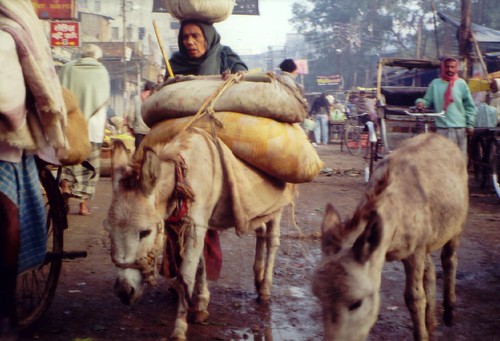'Green Revolution' Trapping India's Farmers In Debt
Posted by Big Gav in agriculture, green revolution, india
NPR has a look at the downside of the "green revolution" in India - 'Green Revolution' Trapping India's Farmers In Debt.
As the world's population surges, the international community faces a pressing problem: How will it feed everybody?
Until recently, people thought India had an answer. Farmers in the state of Punjab abandoned traditional farming methods in the 1960s and 1970s as part of the national program called the "Green Revolution," backed by advisers from the U.S. and other countries.
Indian farmers started growing crops the American way — with chemicals, high-yield seeds and irrigation. Since then, India has gone from importing grain like a beggar, to often exporting it. But studies show the Green Revolution is heading for collapse.
A Thirst For Water
On a recent morning, a drilling rig is pounding away in the middle of a wheat field near the village of Chotia Khurd. The sound, part jackhammer and part pile driver, is becoming increasingly common in the farm fields of northern India's Punjab region.
The farmer, Sandeep Singh, is supervising and looking unhappy as the rig hammers away, driving deeper and deeper under his field in search of water.
When India's government launched the Green Revolution more than 40 years ago, it pressured farmers to grow only high-yield wheat, rice and cotton instead of their traditional mix of crops.
The new miracle seeds could produce far bigger yields than farmers had ever seen, but they came with a catch: The thirsty crops needed much more water than natural rainfall could provide, so farmers had to dig wells and irrigate with groundwater.
The system worked well for years, but government studies show that farmers have pumped so much groundwater to irrigate their crops that the water table is dropping dramatically, as much as 3 feet every year. So farmers like Sandeep keep hiring the drilling company to come back to their fields, to bore the wells ever deeper — on this day, to more than 200 feet.
Farmers In Debt
The groundwater problem has touched off an economic chain reaction. As the farmers dig deeper to find groundwater, they have to install ever more powerful and more expensive pumps to send it gushing up to their fields.
Sandeep says his new pump costs more than $4,000. He and most other farmers have to borrow that kind of cash, but they are already so deep in debt that conventional banks often turn them away.
So Sandeep and his neighbors have turned to "unofficial" lenders — local businessmen who charge at least double the banks' interest rate. The district agriculture director, Palwinder Singh, says farmers can end up paying a whopping 24 percent.
Another side effect of the groundwater crisis is evident at the edge of the fields — thin straggly rows of wheat and a whitish powder scattered across the soil.
The white substance is salt residue. Drilling deep wells to find fresh water often taps brackish underground pools, and the salty water poisons the crops. "The salt causes root injuries," Palwinder says. "The root cannot take the nutrients from the soil."
Destroying The Soil
In the village of Chotia Khurd, farmers agree that the Green Revolution used to work miracles for many of them. But now, it's like financial quicksand.
Studies show that their intensive farming methods, which government policies subsidize, are destroying the soil. The high-yield crops gobble up nutrients like nitrogen, phosphorous, iron and manganese, making the soil anemic. The farmers say they must use three times as much fertilizer as they used to, to produce the same amount of crops — yet another drain on their finances.
A farmer named Suba Singh has seen the good and bad effects of the Green Revolution. Clad in a bright blue turban and his face furrowed like a field, he opens a squeaky wooden gate to his compound. He points to a small building made of mud and straw, with faded green doors.
"That's where my family used to live," he says.
During the profitable years of the Green Revolution, he saw that everyone else in the village was building brick houses. "So I took out a loan," he says, "and built a brick house for my family, too." He turned the old mud house into his cattle shed. But now he is in debt.
A study by the Punjab State Council for Science and Technology calls it a "vicious cycle of debt." Suba and the other farmers say they've had to borrow money to buy just about everything that makes them look prosperous — their brick homes, tractors, cattle, even their plastic chairs.
The farmers have also built their Green Revolution farms and lifestyle on another unstable source of money: Family members have moved overseas to find jobs, because they couldn't make a living farming, and now they send part of their income back to Chotia Khurd to support their relatives. "It's like a disease that is catching on in the world," says Suba, "building a life that is like a house of cards."
A System About To Collapse?
Some leading officials in the farming industry wonder when this house of cards might collapse. "The state and farmers are now faced with a crisis," warns a report by the Punjab State Farmers Commission.
India's population is growing faster than any country on Earth, and domestic food production is vital. But the commission's director, G.S. Kalkat, says Punjab's farmers are committing ecological and economic "suicide."
If he is correct, suicide is coming through national policies that reward farmers for the very practices that destroy the environment and trap them in debt. Kalkat says only one thing can save Punjab: India has to launch a brand new Green Revolution. But he says this one has to be sustainable.






